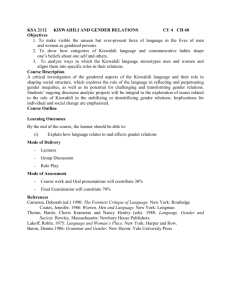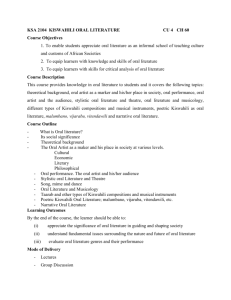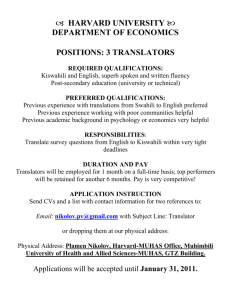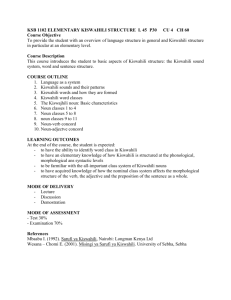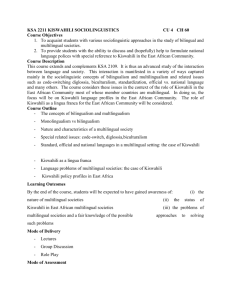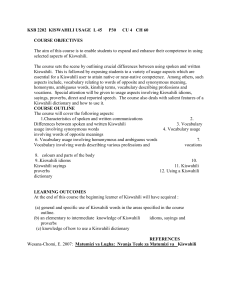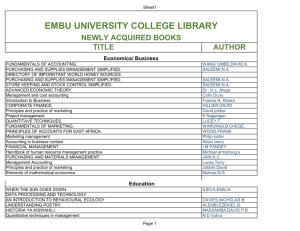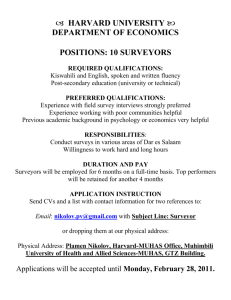Promoting Multilingual Internet by Software Localization: the Challenge of creating terms
advertisement
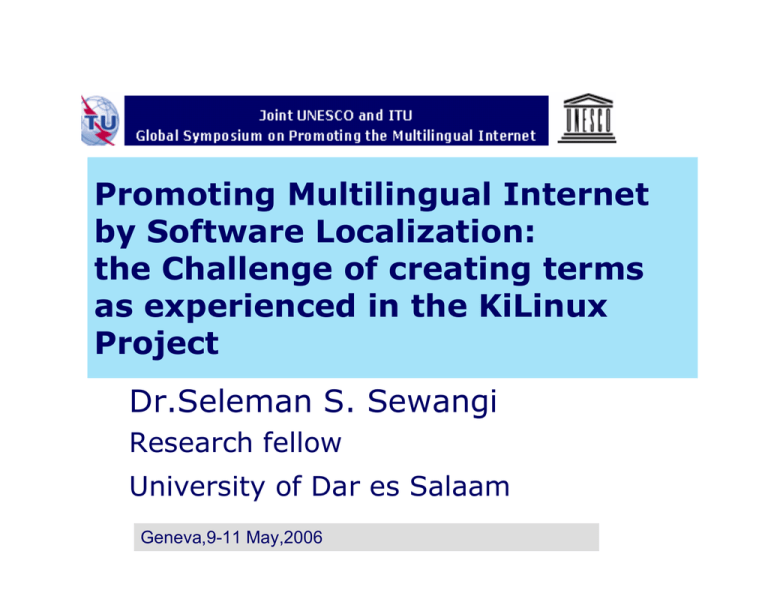
Promoting Multilingual Internet by Software Localization: the Challenge of creating terms as experienced in the KiLinux Project Dr.Seleman S. Sewangi Research fellow University of Dar es Salaam Geneva,9-11 May,2006 Definition of Terms • Kiswahili is a Bantu language, generally spoken by more than 130 million people all over the world. It is both official and national language of Tanzania and Kenya. • KiLinux is an acronym for Kiswahili Linux. • KiLinux Project is the project of Localising Linux Operating System (OS) into Kiswahili. The Project is being implemented by the University of Dar es Salaam since September 2004. • Software Localisation, according to Dohler (1997), is a process of adapting a software program to a specific locale, i.e. to its language, standards and cultural norms as well as to the needs and expectations of a specific target market. Introduction • Promoting multilingual internet implies increasing the population of computer users all over the world, i.e., internationalisation of computer application knowledge. • Spreading of computer knowledge involves teaching people how to operate the relevant computer systems. The teaching and learning of the knowledge is easier where people use their own language. • Unfortunately most software is available in English. This has become a big obstacle in the learning of computer knowledge, especially for the people who can not use English. • Making computer programs interact in languages of different locales, i.e., localization of the programs, is one of the big challenges in the promotion of multilingual Internet. • This paper focuses on localization of computer programs especially on the challenge of creating terms for translating the program source language into the language of a targeted locale. • Normally, as Dohler (1997) puts, discussions on software localization concentrate on issues such as software engineers and web site designers rather than on the translation issues. • The paper takes the neglected direction by highlighting the challenges of creating terms for the localization process as experienced in the KiLinux Project. Background to the KiLinux Project • The Project was developed by the Department of Computer Science in collaboration with the Institute of Kiswahili Research, both of the University of Dar es Salaam, with the following objectives: 1. To localise the Linux OS and front end applications into Kiswahili 2. To teach the prospective Kiswahili Linux users on how to apply the software 3. To make Kiswahili Linux a tool for ICT research in East African, and Tanzania in particular 4. To establish and coordinating UNIT that will maintain the Kiswahili related Linux and open source software in general Why Localising Linux OS • It is of the project developers’ opinion that spreading of computer knowledge through localisation is only possible where software developers permit free distribution and modification of their products. • This requirement is met by the developers of the Open source software, hence its choice for the localisation. Localisation Team and tasks • The KiLinux localisation team comprises of two categories of experts: 1. Computer scientists and 2. Kiswahili-based linguists. • Each sub-team operates under a team coordinator. The Tasks • The team of Computer scientists implement technical tasks related to the computers. Also, they compiled the list of technical terms and strings to be translated, as well as defining the concepts for the translators • The team of Kiswahili experts created Kiswahili equivalents for the English terms and strings as supplied to them by the other team Challenges of Creating Kiswahili terms • The team of term developers was faced by a number of difficulties such as : 1. Presence of some concepts that are new to the culture of Kiswahili speaking locale. For example the concept of time as specified in am and pm is very new to Kiswahili culture, which specifies time in 12 hours day and 12 hours night. 2. Presence of many new concepts to Kiswahili language. 3. Wrong interpretation of some concepts. For example the concept ‘double click’ was perceived as ‘click twice’; overwrite as ‘writing too much’ 4. Presence of competing equivalent terms. For example ‘kompyuta and ‘ngamizi’ for the term ‘computer’, ‘bao bonye’ and ‘kibodi’ for the term keyboard 5. Lack of enough command of the term Translate Tool Kit used for software localization 6. Reluctant to accept challenges from other members of the team. For example, being irritated when the suggested term is rejected by the team 7. Time constraint. Term creation requires more time then the one allocated by the project developers The way out • The difficulties faced by the term developers were resolved by deferent processes such as: 1. Applying the Kiswahili culture to adapt foreign concepts. For example the time concepts of pm and am were adapted as mu and um respectively This was done by taking into account that in Kiswahili culture the pm time starts during the day ‘mchana’ and ends during the night ‘usiku’ hence the acronym mu for the English pm. On the other hand the am time starts during the night ‘usiku’ and ends during the day ‘mchana, hence um for am 2. Applying different strategies for coining new terms such as: a. borrowing and naturalization, especially for the very new concepts e.g. operetta for operator; moduli for module b. semantic extension c. simple equivalents d. acronyms 3. Training of the members on how to use the available tools for translation. This was done in a workshop organised for that purpose 4. Standardization of the suggested terms in a panel of computer scientists and term developers Achievements • The project so far has achieved the following: 1. Finished the localization and building of the Kiswahili Jambo Open Office 1.1.3 which is in use at the moment. 2. Finished the localization and building of Mozilla/Firefox 1.0.3. Projections • Compilation of English-Kiswahili computer dictionary basing in the created terms • Migration of Jambo OpenOffice 1.1.3 into 2.0 • Migration of Jambo Firefox 1.0.3 into 1.5.1 • Dissemination of the localized products to the prospective users Conclusion • Briefly we have seen the general picture of the KiLinux Project and the implementation of the term development task. This is one of the very few localization projects in Africa • As a member of the project team, the project implementation has been very helpful to the team members as it goes hand in hand with training both in computer and linguistic aspects • The project is dynamic in the sense that it involves writing and re-writing of the programs as they keep coming up. For example, the KiLinux team will soon start rewriting the Jambo Open Office 1.1.3 into Jambo Open Office 2.0. References • http://accurapid.com/journal/softloc.htm • Bamgbose, A. 1986: Guide to terminology for African Language Education UNESCO.S
